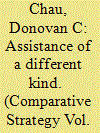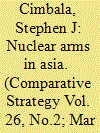| Srl | Item |
| 1 |
ID:
077738


|
|
|
|
|
| Publication |
2007.
|
| Summary/Abstract |
The recent spotlight on Communist China's relations with African nations is not the first time it has occurred, nor will it be the last. In the 1960s, similar commentators and supposed scholars on the subject brought attention to the "Red Peril" or "Red Invasion" descending onto Africa. The past obsession was with Communist expansionism; the current one, with access to raw materials and natural resources. What past and current assessments fail to account for fully, however, is Chinese grand strategy - and one grand strategic instrument, in particular, called political warfare. Long ago discarded and ignored by the Western powers, political warfare, rightly understood, is a nonviolent instrument of grand strategy involving coordinated activities that have tangible effects on intended targets. China on the African continent used this assistance of a different kind in the past and continues to use it today. This historical case study of Chinese political warfare in Ghana sheds light on China's past operations in Africa, which has direct implications for its current policies and potential responses to them
|
|
|
|
|
|
|
|
|
|
|
|
|
|
|
|
| 2 |
ID:
077737


|
|
|
|
|
| Publication |
2007.
|
| Summary/Abstract |
Neither a balance of power model nor a balance of terror model can predict with assurance whether nuclear Asia will be stable or unstable. Even if fewer than eight states in Asia become nuclear weapons states, the problems of crisis management and escalation control, growing out of clashes between conventional armed forces, becomes harder to manage. As well, nuclear weapons have psychological effects on their owners, and not always predictable ones. Classic balance of power theory, written prior to the nuclear age, anticipated the use of small wars for intrasystemic adjustments without the elimination of major actors. Balance of terror theory regards small nuclear wars as possible escalators into larger ones. Europe's nuclear experience may be a misleading guide for twenty-first century Asia - with regard to the effects of both power and terror relationships
|
|
|
|
|
|
|
|
|
|
|
|
|
|
|
|
| 3 |
ID:
077735


|
|
|
|
|
| Publication |
2007.
|
| Summary/Abstract |
Unlike the previous adversarial relationship between the United States and the Soviet Union, where communications and an understanding nuclear signaling developed over decades and were generally effective, communication of intent at a time of escalating tension during a crisis between the United States and a nuclear-armed regional aggressor is likely to be complicated by myriad asymmetries, for example culture, intelligence capabilities, and doctrine. This article considers the characteristics required of successful nuclear signaling in such a context, the options currently available to the United States, and possible alternatives for the future
|
|
|
|
|
|
|
|
|
|
|
|
|
|
|
|
| 4 |
ID:
077736


|
|
|
|
|
| Publication |
2007.
|
| Summary/Abstract |
Some critics of the U.S. strategy for strategic forces claim that this new strategy undermines the tenets of the Nuclear Non-Proliferation Treat (NPT). However, much of the criticism is based on outdated logic and errant characterizations of the strategy. Those who support the NPT and seek to limit nuclear proliferation should take a closer look at the U.S. strategy. They should find a lot to like about the new U.S. strategy. As NATO looks at options for its aging nuclear force in the emerging geopolitical environment, it may do well to consider a concept that parallels the new U.S. approach.
|
|
|
|
|
|
|
|
|
|
|
|
|
|
|
|